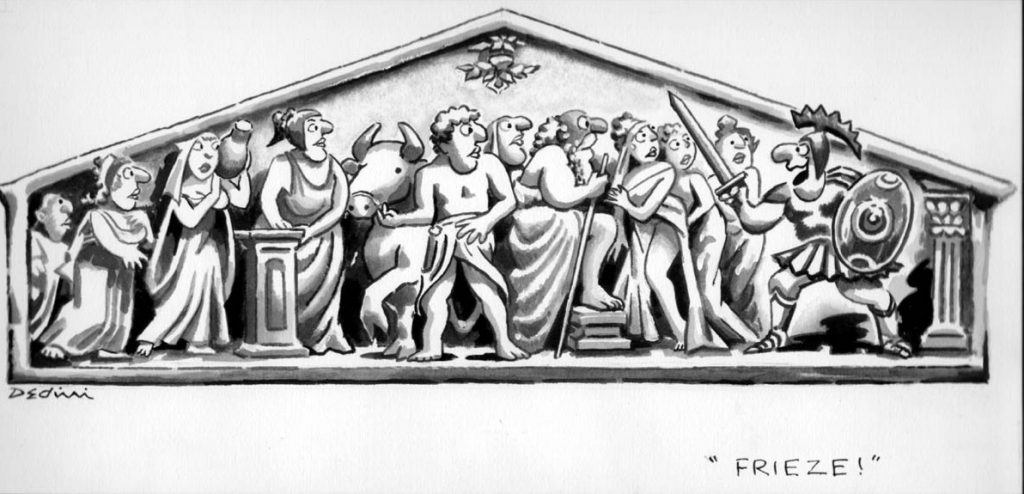Satire from a shaky place – Pastoral Backstory – August 18th, 2016


August 18th, 2016
So maybe you saw this earlier in the week:
http://babylonbee.com/news/presbyterian-church-asks-congregants-please-silence-movements-spirit-service/
We laughed. Heartily.
Then maybe a bit nervously–since satire, when done well, doesn’t let its exaggeration overshadow the pointed kernel of truth that gave rise to it. Yes, Presbyterians are known more for their clarity of thought and good order than their expectancy of the unpredictable Spirit of God. That’s why we laughed. Our public profile has “earned” that caricature. We deserve it, and maybe even could stand to let its mockery have its way with us in an “always reforming” way.
Presbyterians weren’t the only ones getting their collective noses tweaked this week (though it did happen again–hilariously). A broader evangelical audience got a ribbing with this headline:
http://babylonbee.com/news/michael-phelps-becomes-immediate-christian-icon-apparent-shout-god/
The reflexive move to claim as “one of ours” those celebrities who express even the subtlest spiritual convictions finds itself in the authors’ crosshairs. Again, the teasing befits the target.
Before we go further, perhaps we should pause here. Not everyone may be familiar with the source of these satirical shenanigans aimed at the modern western church. The Babylon Bee is only the latest in a lineage of sardonic journals aimed at poking fun at the more embarrassing idiosyncrasies of the church in America. Before the _Bee_ was the locally owned and operated Wittenberg Door, often more caustic and across the line than where the _Bee_ typically goes.
But the _Bee_ has been known to provoke more than laughter at times, its parodies occasionally (and unapologetically) embedding a tone more critical than comical. On the whole though, amid a western church that is too often known for taking itself too seriously, the Bee provides a forum where the church can laugh at itself, while a wider world can perhaps respect the church’s capacity for self-deprecation.
We showcase this site that loves to lampoon not just because we could stand a laugh from time to time, but because of its founder and editor Adam Ford.
_Christianity Today_ spoke with him recently about his history and motivations for creating the site. But prolific blogger Tim Challies invited Ford himself just this week to share the one part of his own life you might not expect to find in one given to satire: profound anxiety.
As you’ll read in his piece, it hasn’t always been this way for him. It was only seven years ago that he found himself caught in what felt like an abyss of quiet terror.
What befell this former self-attested extrovert left him not only gripped but also exhausted and utterly bewildered. And as a Christian it also left him oftentimes misunderstood. How can one born and reared in the church, imbued with the beauty and majesty of the gospel, still feel like a man cut off from goodness? Ford has had to contend not only with the depredations of his anxiety but the subtle expectations–from others and himself–that his acquaintance with the blessings of an eternal inheritance would inoculate him against what often paralyzes him.

In our continuing series on Jesus’s Sermon on the Mount, we’ll look this Sunday at a second way He is out to reimagine salvation for us.
Last week we argued Jesus elevates the concept of deliverance to stand alongside the idea of forgiveness as the centrality of our salvation. And we found in 6:19-24 the way He means to deliver us us from certain illusions. Our passage this Sunday (vv. 25-34) involves deliverance of another sort–this time from insecurity. The one word that threads its way through the whole passage is “anxiety.” Not in a generalized sense, but stemming from concern over provision of certain essentials for our flourishing.
That which brought anxiety to those sitting at Jesus’ feet that day isn’t precisely what provokes anxiety for most of us in an industrialized setting (but you don’t have to drive too far to find people for whom this passage has immediate relevance.) But the arguments Jesus marshals to confront those reasons for anxiety have relevance to any reason for anxiety.
Do arguments against anxiety fall flat for Adam Ford? On the contrary, he says. The knowledge of God’s nearness, concern, and power–to say nothing of Jesus’s acquaintance with our affliction–are all precious to him; meditation upon them are part of his arsenal against his affliction. (Just read a recent reflection on Charles Spurgeon’s wrestling with the same to see how someone else may credibly synthesize one’s struggle with anxiety with one’s belief in the gospel.) But as Ford also contends, our shame which Jesus has taken at His cross includes the shame we might feel in our struggle with our frail selves and this still broken world.
We’ll end this Backstory as we began–on a satirical note. This time from our friends and sister church in Houston, CityChurch.
And there’s no need to ask your pastor if AchieveMax is right for you.
Wait! One more thing. Coming to our inaugural Open Arts Night this Saturday? You will see quite a breadth of artistic expression from among members and regular attendees alike. We hope this is a true beginning of a broader and deeper effort to cultivate the arts within our community and beyond it. So come on over to the Harris home at 6:30p.
